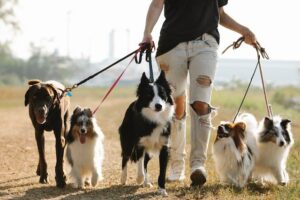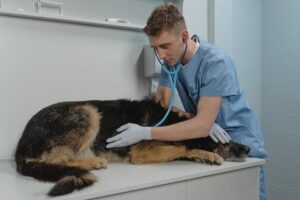The Canine Code: Educating Owners on Responsible Dog Ownership to Reduce Bites
Welcome to our guide on educating owners on responsible dog ownership to reduce bites. It is a vital topic for every pet parent who seeks to understand their furry companion better and ensure their safety and happiness. Owning a dog is a rewarding experience, yet it comes with significant responsibilities. It’s not just about providing food and shelter; rather, it’s about understanding their needs, behavior, and environment. A well-cared-for dog is usually a well-behaved dog. It directly impacts the likelihood of bite incidents. Have you ever wondered how your daily routines and interactions influence your dog’s behavior? Or how can your approach to their training and care prevent unfortunate incidents? We aim to shed light on these questions through this article, offering practical advice and insights to foster a harmonious relationship between you and your dog.

Understanding Your Dog’s Language
Understanding your dog’s body language is vital to fostering a safe and happy relationship. Dogs communicate much through their posture, facial expressions, and actions. Recognizing these signs is crucial to prevent unwanted happenings, like bites. Here’s a straightforward guide to help you interpret your dog’s language:
- Signs of Anxiety
- Pacing or restlessness.
- Excessive yawning or licking lips.
- Avoiding eye contact.
- Tucking the tail between their legs.
- Indicators of Aggression:
- Growling or snarling.
- Stiffening of the body.
- Baring teeth.
- Intense, direct eye contact.
- Fearful Behavior:
- Cowering or shrinking away.
- Flattening ears against the head.
- Shivering or trembling.
- Trying to escape or hide.
The Pillars of Training: Beyond Basic Commands
Training your dog goes far beyond the basics of ‘sit’ and ‘stay.’ Consistent training is crucial in bite prevention, ensuring your dog understands how to behave in various situations. Basic commands lay the foundation for communication between you and your pet. They instill discipline, and in everyday scenarios, they help prevent accidents and manage your dog’s behavior.
However, advanced training techniques are equally important to enhance your dog’s behavior. It involves training that stimulates their mind, teaches impulse control, and reinforces positive behavior in more challenging environments. Techniques like clicker training, agility training, and socialization exercises are beneficial. They keep your dog mentally engaged while strengthening your bond with them. This comprehensive approach to training makes your dog more adaptable and less likely to react negatively, reducing the risk of bites.

Educating Owners on Responsible Dog Ownership to Reduce Bites
Responsible dog ownership reduces the risk of dog bites and potential legal troubles. It involves a combination of proper socialization, consistent training, and heightened owner awareness. Socializing your dog from a young age helps them feel at ease in different situations, reducing fear and aggression. Owner awareness means understanding your dog’s needs, health, and warning signs of distress or aggression.
Statistics underscore the importance of these practices. According to the American Veterinary Medical Association, dogs that have not been spayed or neutered are more likely to bite. Likewise, a Journal of Veterinary Behavior study found that dogs with less training are more prone to aggression. These findings highlight a clear link between responsible ownership and reduced bite incidents.
Creating a Safe Environment for Your Dog
Creating a safe environment for your dog is crucial for their well-being and behavior. A comfortable space reduces stress, directly impacting a dog’s likelihood of biting. Start by ensuring your home is dog-friendly. Remove hazards like loose wires or toxic plants and offer a dedicated space for your dog, with a cozy bed and their favorite toys. This personal area gives them a sense of security and belonging.
Consistency in their environment helps dogs feel secure, while sudden changes can cause anxiety, leading to unexpected behavior. Therefore, gradual adjustments to their surroundings can help ease any discomfort. This advice is especially noteworthy if you plan to relocate with your pet over a long distance.
Therefore, prepare them on time for this new experience. Introduce them to a travel crate or carrier well before the move and let them spend time inside, initially with the door open. Ensure the crate is comfortable, with ample space for your dog to stand, turn, and lie down. Including familiar bedding and toys also helps the crate feel like a safe space. In the end, following these guidelines will make the experience of moving with your dog more pleasant for you and your furry friend.

The Role of Health in Canine Behavior
A dog’s health is closely related to its behavior. This aspect is often overlooked in discussions of responsible dog ownership to reduce bites. A dog in pain or discomfort can exhibit behavioral changes, sometimes leading to aggression or biting. Common health issues like dental pain, arthritis, or skin allergies can cause discomfort, making dogs more prone to snapping or biting when touched in a painful area.
Hormonal imbalances and neurological disorders can also alter a dog’s behavior, leading to unpredictability or aggression. Lastly, regular veterinary check-ups can help detect and manage health issues early on, reducing the risk of bite incidents. Veterinarians can guide managing chronic conditions and advise on behavioral changes that might signal health problems. Regular health assessments ensure your dog is physically fit and mentally well-adjusted.
Legal Responsibilities and Your Dog
Owning a dog comes with specific legal responsibilities that are crucial for every pet owner to understand. For instance, most regions require dog owners to register their pets and keep them vaccinated, particularly against rabies. Leash laws are common, too, requiring dogs to be on a leash in public spaces to prevent accidents and attacks.
Neglecting these legal responsibilities can lead to grave consequences and dog-bite lawsuits. If a dog bites someone, the owner might face legal action, including fines or, in severe cases, criminal charges. Also, the repercussions can be more severe if the dog is not registered or vaccinated.
Local laws on dog bites and ownership vary. Dog owners need to be informed about the specific regulations in their area and help ensure the safety and well-being of the dogs and the community.
When Professional Help is Needed
Signs that indicate the need for a professional include persistent aggressive behavior, extreme fearfulness, or inability to adapt to basic training. These issues can escalate if not addressed, leading to safety concerns for the dog and those around it.
Dog behaviorists and trainers are skilled in addressing a range of behavioral issues. They employ specialized techniques to modify undesirable behaviors, ensuring your dog is well-adjusted and friendly. Behaviorists can delve into deeper psychological issues, while trainers focus on obedience and specific commands.
Finding the right professional for your dog involves research and referrals. Look for certified professionals with a track record of success. Choose someone who uses positive reinforcement techniques and whose approach aligns with your dog’s needs. This investment in professional help can significantly improve behavior and overall well-being.
Conclusion
Educating owners on responsible dog ownership to reduce bites involves a comprehensive understanding of your pet’s needs, behaviors, and health. It’s about more than just affection; it’s about commitment to training, socialization, and regular health check-ups. Recognizing when to seek professional help is also crucial. As a responsible dog owner, your role is to ensure your dog’s well-being, contributing to a safer community. We encourage all dog owners to continue learning and applying these principles. In essence, your efforts enhance your bond with your pet and significantly prevent bite incidents. Let’s all strive for responsible dog ownership to benefit our beloved pets and those around them.
